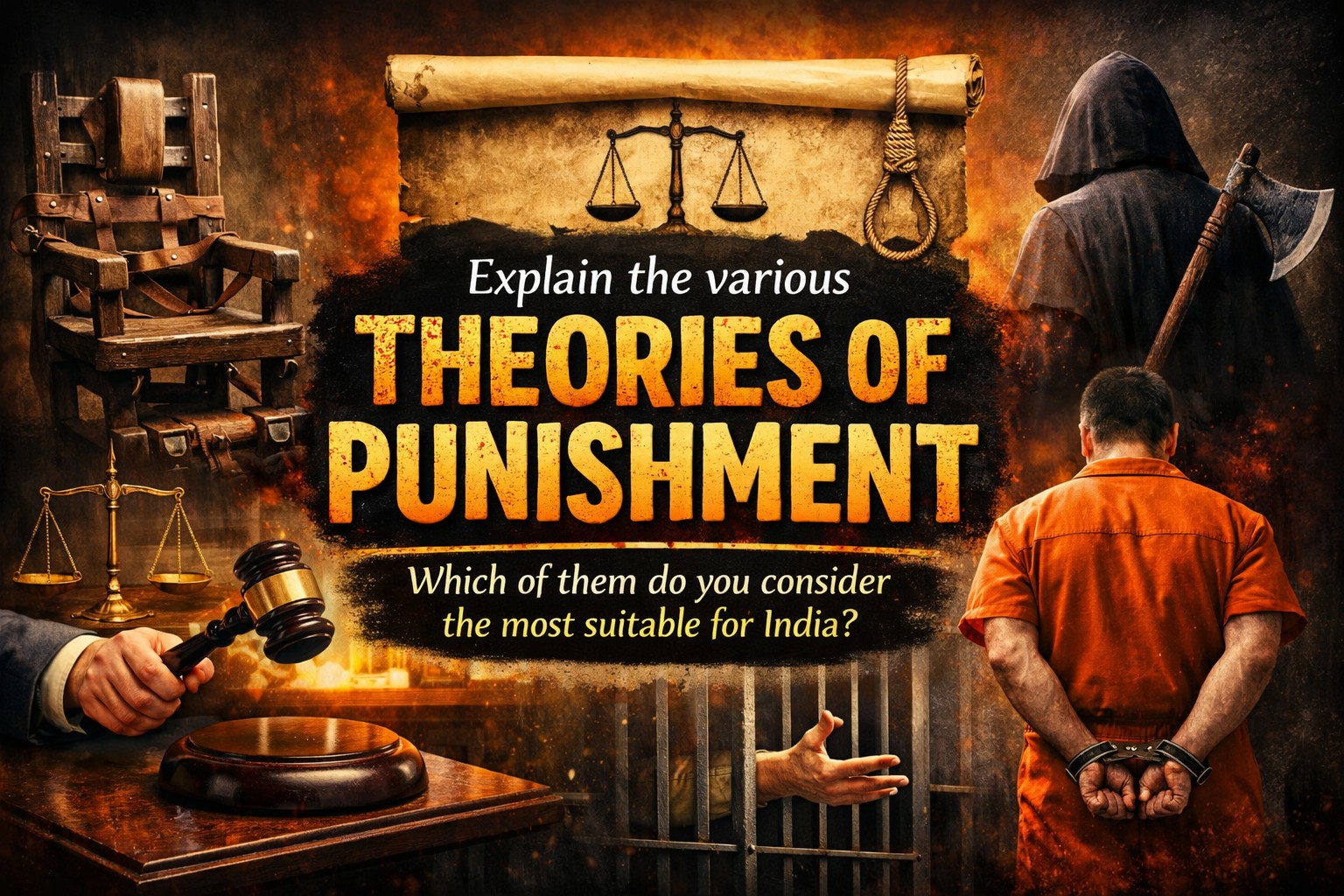Explain the various theories of punishment. Which of them do you consider the most suitable for India ?
Or
Critically examine the purpose of Administration of Criminal .Justice and its utility.
Or
Examine the merits of Theories of Punishment and Trace its importance in Administration of Criminal Justice.
Ans. Purpose of criminal justice and theories of punishment.—We can regard the punishment as a method of protecting society by reducing the occurrence of criminal behaviour, or else we can consider it as an end in itself. Punishment can protect society by deterring potential offenders, by preventing the actual offender from committing further offences and by reforming and turning him into a law-abiding citizen. Thus the problem of punishment has been approached by the following theories of punishment-
1. Deterrent
2. Retributive
3. Preventive
4. Reformative.
(1) Deterrent theory.—It is the essential and all important one, the others being merely accessory. Punishment is before all things deterrent, and the chief end of the law of crime is to make the evil-doer an example and a warning to all that are like-minded with them. Offences are commit-ted by reason of a conflict between the interest, real or apparent, of the wrong-doer and those of society at large. Punishment prevents offences by destroying this conflict of interests to which they owe their origin—by making all deeds which are injurious to others, injurious also to the doers of them—by making every offence in the words of Locke “an ill bargain to the offender”. Men do injustice because they have no sufficient motive to seek justice, which is the good of others rather than that of the doer of it
The deterrent theory has two-fold effects. Firstly, the offender ab-stains from committing offence in the future and secondly, those persons of the society who have got a criminal bent of mind and may commit offence in future take lesson from the punishment of the offender. The deterrent theory of punishment claims that by infliction of punishment adequately and rationally, the offender and the likely offenders deter from committing offence punishment in rationalised quantity or an ad-equate punishment depends upon the circumstances of each case by taking into consideration the severity of offence, its modes, age of the offender, cause of the offence, whether it is first offence, barbarity in commission of offence, weapon chosen for the offence, deliberate or sudden on provocation of something seen or it is in retaliation etc. Deterrence does not mean extinction of the offender.
This theory was the basis of punishment in England in medieval times. In India also, Manu, the great Hindu law-giver, has said that penalty keeps the people under control, penalty protects them, penalty re-mains awake when people are asleep, so the wise have regarded punish-ment as source of righteousness.
This theory has been criticised for being ineffective to check the crimes. The punishment hardens the criminal instead of creating in his mind the fear of law. Hardened criminals are not afraid of imprisonment. The punishment loses its fear when once the criminal is punished.
(2) Retributive theory.—It gratifies the instinct of revenge or retali-ation, which exists not merely in the individual wronged, but also by way of sympathetic extension in the society at large. The emotion of retributive indignation, both in itself regarding and its sympathetic forms, is even yet the mainspring of criminal law. It is to the fact that the punishment of the wrong-doer is at the same time the vengeance of the wronged, that the administration of justice owes a great part of its strength and effectiveness. It is a very widely held opinion that retribution in itself, apart altogether from any deterrent or reformative influences exercised by it is right and reasonable thing and the first reward in equity. According to this view, it is right and proper, without regard to ulterior consequences that evil should be returned for an evil. An eye for an eye and a tooth for a tooth is deemed a plain and self-sufficient rule of natural justice which epitomises the retributive theory of punishment. Supporters of this theory are Kant and Hegel.
From the Utilitarian point of view such a conception of retributive punishment is totally inadmissible. Punishment is in itself an evil, and can be justified only as a means of attaining a greater good. Retribution is in itself not a remedy for the mischief, but an aggravation of it. Form of idea of purely retributive punishment is that of expiation. In this view crime is done away with, cancelled, blotted out or expiated, by the suffering of its appointed penalty. To suffer punishment is to pay a debt due to the law that has been violated. Guilt plus punishment if properly suffered is equal to innocence. Justice requires that the debt be paid, that the wrong be expiated. This is the first object of punishment to make satisfaction to outraged law. Revenge is the right of the injured person. The penalty of wrong doing is a debt which the offenderl5wes to his victim, and when the punishment has been endured, the debt is paid, the liability is extinguished, innocence is substituted for guilt and the vinculutn furls forged by crime is dissolved.
The object of true redress is to restore the position demanded by the rules of right, to substitute justice for injustice to compel the wrong-doer to restore to the injured person that which he has lost, but a dead man cannot be revived hence if the guilty is punished, the living relations of the wronged will feel a sort of satisfaction and their retaliation accom-plished within the limits of law.
(3) Preventive theory.—This theory of punishment is associated with the name of Feverbach who asserts that prevention is better than cure. If the violations of law are to be prevented, there must exist physical restraint. Such a constraint can only be of a psychological nature. Mr. Justice Holmes said ; There can be no case in which the law-maker makes certain conduct criminal without his thereby showing a wish and pur-pose to prevent that conduct. Prevention would accordingly seem to be the chief and only universal purpose of punishment. The law threatens certain pains if you do certain things, intending thereby to give you a new motive for not doing them. If you persist in doing them, it has to inflict the pains in order that its threats may continue to be believed.”
The primary and general purpose of this theory is to deter by fear, its secondary and special purpose is, wherever possible and expedient, to prevent a repetition of wrong by the disablement of the offender. We hang murderers, not merely that we may put into the heart of others like them the fear of a similar fate; but because it is better for us that they should be out of the world than in it. In modern times the disabling aspect has been emphasised by the statutes conferring upon Judge the power to sentence habitual offenders to preventive terms of imprisonment. Such Acts are National Security Act (NSA) and The U.P. Gangsters & Anti-social Activities (Prevention) Act, 1986. Under the Preventive Detention Laws when the authorised authority becomes satisfied a person may be sent to jail to prevent the commission of offence, even though proper safeguards in the shape of Advisory Board’s and time limit of 60 days must be applied for protecting the personal liberty of the detenue, for avoidance of misuse of the provisions of preventive detention.
(4) Reformative theory.—The supporters of sociological school headed by Ihering have evolved this theory. They say that the object of punishment must not be to wreck vengeance, but so to reform the criminal as to prevent him from committing further crime. Crime like other diseases should properly be diagnosed and treated scientifically. Punishment must not be regarded as an end but only a means to an end, the end being reclamation of the criminal to become a good citizen. Further, Maitland considers that the personality of the offender is as important as his act and emphasises that the wrong-doer is not only a crinfinal to be punished but a patient to be treated. The effort is for individualisation of the penalty, not to let the punishment fit the crime but the personality of the criminal.
Salmond raises three objections to the purely reformative approach–
(i) If criminals are sent to prison in order to be transformed into good citizens, then for the habitual criminals the prison cells will be turned into varied houses far too comfortable to serve as an effective deterrent against the crimes.
(ii) There are in the world men who are incurably bad and are beyond the reach of reformative influences.
(iii) The crimes in this way will be a profitable industry which will flourish accordingly.
Salmond concludes, therefore, that the perfect system of criminal justice is based on neither the reformative nor the deterrent principle exclusively. It is rather the result of a happy compromise between them. In this compromise it is the deterrent principle which possesses predominant position. At the same time the reformative element must not be overlooked though it should not assume undue importance.
Approach to the problem of criminality.–The problem of criminality must be approached from a realistic and not dogmatic point of view. So viewed, it would be discovered that all men may not be saints but they certainly are, as a rule, sinners and criminals. Law abiding citizen is the rule and law breaker, the exception; laws should not be laid down solely with reference to the exceptions though they must provide for them too. Secondly, it should not be forgotten that crimes and violations of law are to no small extent, due to unhappy situations and defective organisation of society. Hence, the need to approach the problem of the crime from a sympathetic and humanitarian point of view becomes imminent and necessary.
Merits and importance of Reformative Theory, in Administration of Criminal Justice.—After intensive research it has been found that certain human instincts which germinate crime e.g. greed, jealousy, vengeance, superiority and killer spirit cannot be obliterated hence wherever human beings will reside, the crime will also register its presence. To tackle this, it was thought proper that for humane, humanitarian and human rights and escape barbarism, the criminal should be treated as a patient and his brain washing and proper treatment by good behaviour and making him wise regarding the pros and coins of criminal life, it is possible to get the criminal rehabitated in the main stream of the society and the blot of being a prisoner should be removed by introducing the system of Probation, Parole, Borstal Schools, First offenders relaxation, etc. for new criminals and for recedivist and hardened criminals the efforts of making them realise that they are humans and should behave like humans. The hard core category of criminals happen to be small in numbers and during their prison term by their proper treatment of their altitude through Psychological Therapy, Yoga and Surmons and by releas-ing them on Parole to check the change in their attitude, criminals may be reformed and a little success will lead to big results and savings. The surrendering of big and notorious dacoits to the administration has proved that brain washing of a criminal is possible and their return to normal life in the main stream ofthe society is also possible—It is better to apply the scheme of rehabilitation of criminals to the society rather than to obliterate or eradicate them. The Socialist School of Thought and Reforms have been successful in producing positive results of this Reformation Theory of Punishment. In our old culture, the device of expiation was permitted and adopted to clean the blemish of guilt and restitute in him the at-tributes of innocence.
The criticism that hardcore and habitual criminals cannot be re-formed becomes tooth and clawless when we find that their degree of killer spirit may be controlled, lessened and regulated by engaging them in different treatment devices of reformation. Moreover, the concept of victomology is gathering grounds and the plea bargaining introduced in Cr. P,C. together will reduce (by obtaining compensation) the retaliation and vengeance from the side of victim of the crime and as such reduce criminality.
Salmond concludes that the perfect ‘system of criminal justice is based on the compromise between reformative and deterrent theories. The deterrent principle should have the last word.
Utility of Administration of Justice.—Administration of justice through courts of law has now become one of the important functions of the state. The courts administer justice according to laws framed by the legislature. The chief merits of administrations of justice are its uniformity, certainty, impartiality and utility. The judges who impart justice are bound to give their decisions according to the fixed principles of law and cannot act arbitrarily. The laws being mostly codified, they a e known to the citizens which enables them to regulate their conduct accordingly. Codification also helps judges in applying the law uniformly without any fear or favour.
Despite the aforesaid advantages, the administration of justice suffers from certain disadvantages also. The main of these are rigidity, formality and complexity of laws. Sir, Salmond has observed that law, undoubtedly is a remedy for greater evil, but it brings with it evils of its own.
Be that as it may, it must be stated that the advantages of administration of justice far outweigh its disadvantages and it is an effective media for establishment of rule of law in modern democracies.






![Maneka Gandhi v. Union of India [1978] 2 SCR 621: A Watershed Moment in Indian Constitutional Jurisprudence](https://www.infipark.com/articles/wp-content/uploads/2026/02/Image-Feb-18-2026-10_47_59-AM-218x150.jpg)













